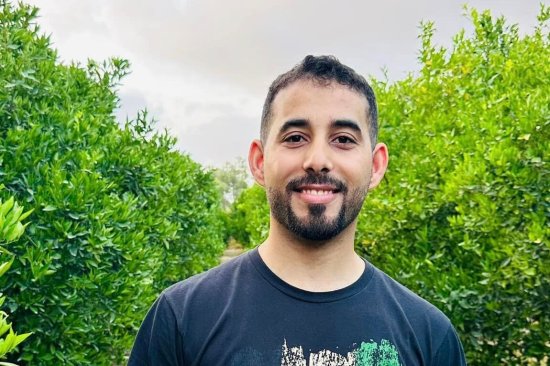
After international outcry over his unexplained detention and temporary unknown whereabouts, the 31-year-old writer was released on Tuesday.
It was only a month ago that award-winning Palestinian poet and writer Mosab Abu Toha, a 31-year-old husband and father of three, published an essay in the New Yorker describing his life in Gaza and the terror and destruction Israeli airstrikes were inflicting on his community. He wrote about bombs dropping in his neighborhood and a barrage of news notifications on his phone alerting to other explosions nearby. “Sometimes I decide not to check the news. We are part of it, I think to myself,” he wrote.
“One idea in particular haunts me, and I cannot push it away,” he wrote. “Will I, too, become a statistic on the news?”
[time-brightcove not-tgx=”true”]This week, Abu Toha’s fears were realized when on Sunday he was abducted by Israeli forces while fleeing south through Gaza to try to evacuate his family. After outcry from Western media companies and publishers including the New Yorker and international rights groups including PEN International over his detention and temporary unknown whereabouts, Abu Toha was released on Tuesday and has reunited with his family in Gaza.
What happened to Mosab Abu Toha?
Diana Buttu, a Palestinian-Canadian lawyer and former peace talks adviser who says she has been in regular communication with Abu Toha’s family, told TIME that Abu Toha’s family had filed for his three-year-old son, who is a U.S. citizen, to be evacuated from Gaza a couple of weeks ago and that they got the clearance for evacuation days later. They waited until it seemed safe enough to travel from the north where they lived to the southern border with Egypt, but midway they were intercepted by Israeli forces, who allegedly approached a group of travelers and separated dozens of men from their families, despite assurances of “safe passage.”
“The army took Mosab when he arrived at the checkpoint, leaving from the north to the south, as the army had ordered,” Abu Toha’s brother Hamza posted on social media on Monday. “It is worth mentioning that the American embassy sent him and his family to travel through the Rafah crossing.”
“He was forced to put his son down,” Buttu says Abu Toha’s wife recounted to her. “They were all forced to walk with their hands raised in the air. He raised his arms in the air … [and he and] around 200 others were taken out of this line and abducted.”
Israeli Defense Forces confirmed in a statement that a group of civilians including Abu Toha were taken into questioning because they received alleged intelligence “indicating a number of interactions between several civilians and terror organizations inside the Gaza Strip.” The IDF statement said Abu Toha was released after questioning.
Buttu claims that Abu Toha was beaten while held in a facility in southern Israel and that he has received medical treatment for injuries sustained.
While the death toll in Gaza has surpassed at least 13,000, according to the enclave’s health ministry, the total number of Gazans who have been detained by Israeli forces in recent weeks remains unclear. Palestinian authorities estimate that the number of Palestinians—excluding those from Gaza—held by Israel has risen to 7,800, according to a Nov. 18 report by Reuters. Meanwhile, Israeli intelligence forces said this week that they recently apprehended and interrogated some 300 suspected “terror operatives” in the Gaza Strip.
Since the beginning of the conflict, some Palestinians have reportedly been arrested simply for expressing solidarity with Gaza’s civilian population amid the violence. “The police say that any slogans in favor of Gaza or against the war mean supporting terrorism,” human rights lawyer Abeer Baker told CNN.
Who is Mosab Abu Toha?
Abu Toha, who was born in the Al-Shati refugee camp, graduated with a degree in English from the Islamic University of Gaza before founding the Edward Said Library, the enclave’s first English-language public library, in his hometown of Beit Lahia in 2017. (A second branch was opened in Gaza City in 2019). He taught English at U.N. Relief and Works Agency schools in Gaza from 2016 to 2019. In October 2019, he left Gaza for the first time to become a visiting scholar at Harvard University.
Last year, Abu Toha published his debut book of poetry, Things You May Find Hidden in My Ear. It won an American Book Award, Palestine Book Award, and Arrowsmith Press’s 2023 Derek Walcott Poetry Prize, and was a finalist for the National Book Critics Circle Award.
Since the war that began with terrorist group Hamas’ attack on Israel on Oct. 7, Abu Toha has published essays and poems about the situation in Gaza in a number of U.S. publications, including the New Yorker, the Washington Post, the New York Times Magazine, the Atlantic, and, most recently, the Nation. In social media dispatches, too, he has documented the destruction of his home, the death of one of his students, and periodic updates on his family’s status.
Executive director of the U.S.-based nonprofit The Jerusalem Fund and fellow Palestinian writer Jehad Abusalim took to X to laud the success of “relentless pressure” put on Israel to resurface Abu Toha. “While not everyone knew Mosab personally, his words, essays, and poems brought him closer to our hearts,” he wrote. “Now, picture this: what if we felt this connected to every individual who has suffered – those killed, injured, or arrested? Consider if each one of them was a poet or a writer, as indeed some were.”